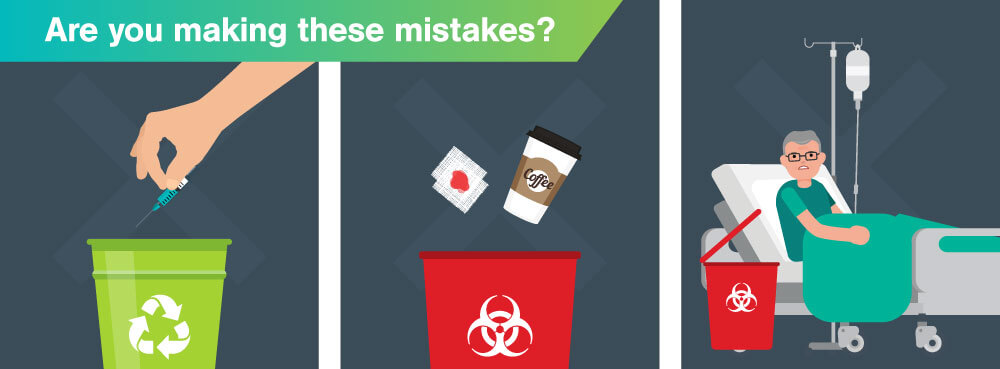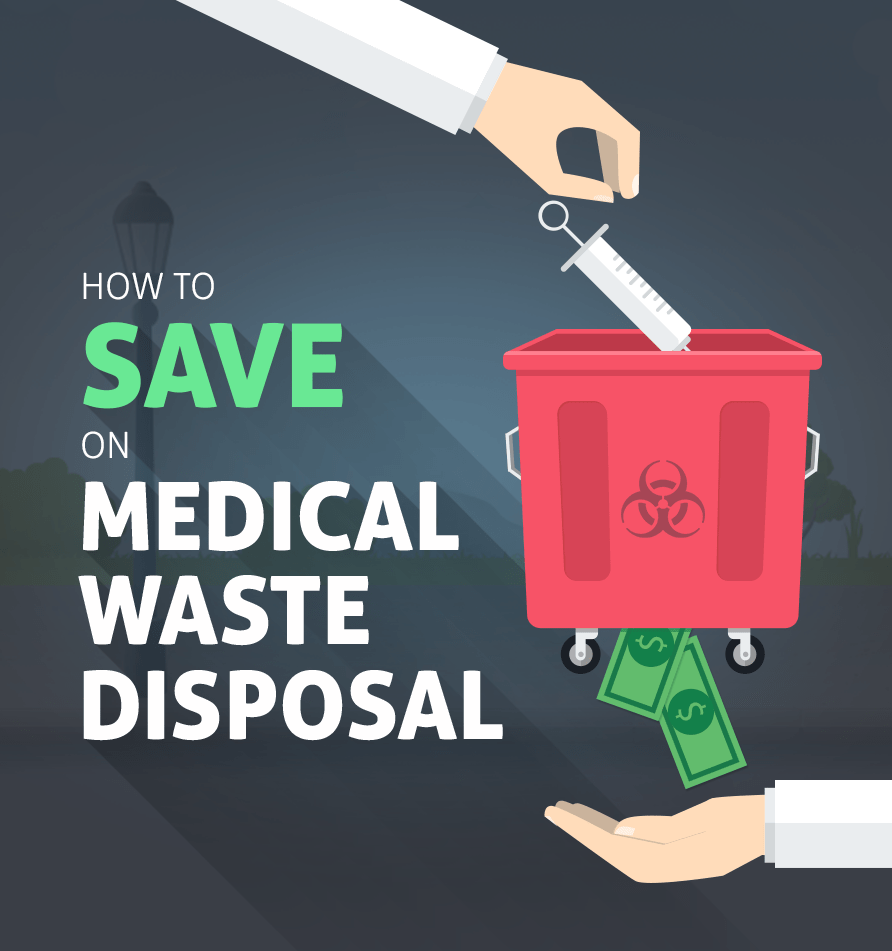Your Ally in Medical Waste Removal: Professional Service with Environmental Care
Wiki Article
Effective Methods of Medical Garbage Disposal
Effective approaches of medical garbage disposal are vital in maintaining public health and wellness and ecological safety and security. Clinical waste, including sharps, pathological waste, and pharmaceutical waste, should be taken care of and taken care of properly to avoid the spread of infections and shield the environment. This needs adherence to rigorous policies and the execution of expert waste monitoring practices.Appropriate partition of clinical waste, safe and safe storage space, reliable treatment and sanitation approaches, and environmentally-friendly disposal options are essential components of an efficient clinical waste disposal system. Expert waste management services play an essential role in guaranteeing compliance with guidelines and decreasing the threats connected with improper disposal. By employing these methods, healthcare facilities can add to a much safer and cleaner environment while protecting the health of the community.
Proper Segregation of Clinical Waste
Correct segregation of clinical waste is important for making certain the reliable and secure disposal of these possibly dangerous materials. Medical waste refers to any waste created throughout healthcare activities, such as hospitals, clinics, laboratories, and research facilities. It consists of a wide variety of products, such as used needles, syringes, contaminated dressings, ended or extra medications, and organic materials.By setting apart medical waste, medical care facilities can decrease the danger of infections, injuries, and ecological contamination. The process entails categorizing waste right into different kinds, such as sharps, infectious waste, pharmaceutical waste, and non-hazardous waste. Each kind requires certain handling, packaging, and disposal techniques to stop direct exposure to healthcare employees, waste monitoring workers, and the public.
To guarantee correct segregation, health care centers ought to establish clear standards and offer ample training to employee. This consists of educating workers on the various waste categories, proper product packaging strategies, and using ideal containers - WasteX Medical Waste Disposal. Furthermore, clear signs and color-coding systems can be applied to help with the identification and segregation of different waste types
Safe and Secure Storage of Medical Waste
Safe and safe storage space of clinical waste is important for keeping the honesty and control of possibly unsafe products. Correct storage space not just protects health care employees and the public from direct exposure to unsafe materials but also avoids ecological contamination.To make sure safe storage, medical facilities must adhere to particular standards. Waste should be saved in puncture-resistant and watertight containers that are identified appropriately. These containers should be snugly secured to stop any type of leakage or spills. In addition, the storage space area should be unattainable and protected to unauthorized employees, lessening the danger of unintentional exposure.
Appropriate segregation of medical waste is also vital for secure storage. Various sorts of waste, such as sharps, transmittable products, and pharmaceutical waste, ought to be divided to stop cross-contamination. This partition can be accomplished through the usage of color-coded containers or containers.
Routine surveillance and assessment of the storage location are crucial to identify any kind of prospective threats or breaches. This consists of checking for indications of damage or degeneration in the containers, guaranteeing correct ventilation, and checking temperature and moisture levels.
Efficient Therapy and Disinfection Approaches

One typically used therapy approach is autoclaving, which involves subjecting the waste to high-pressure steam at temperature levels over 121 degrees Celsius. This process successfully eliminates bacteria and destroys contagious representatives, rendering the waste safe for additional disposal. An additional Learn More Here technique is incineration, which involves burning the waste at high temperature levels. Incineration not only gets rid of microorganisms yet additionally reduces the waste volume with combustion.
Chemical sanitation is one more efficient method for dealing with clinical waste. This method involves making use of anti-bacterials such as chlorine compounds, phenolic substances, or hydrogen peroxide to eliminate or inactivate virus (WasteX Medical Waste Disposal). Chemical sanitation is commonly used for fluid waste, such as lab samples or physical fluids
Over the last few years, different treatment methods such as microwave sanitation, irradiation, and organic treatment have actually likewise acquired attention. These techniques use benefits such as decreased environmental impact and energy consumption compared to conventional methods.
Environmentally-friendly Disposal Options
In the world of clinical garbage disposal, taking into consideration environmentally-friendly choices is vital. Medical care facilities create a substantial quantity of waste, including contagious materials, drugs, and chemicals, which can present severe threats to human health and wellness and the setting if not managed effectively. Thankfully, there are several environmentally-friendly disposal choices readily available that can assist minimize these risks.
Reusing medical waste entails setting apart and processing particular products for reuse or repurposing. In addition, some healthcare facilities have carried out reusing programs for particular medical gadgets or devices, additional minimizing waste generation.
This method entails transforming medical waste into power via procedures like incineration or anaerobic food digestion. Anaerobic digestion, on the other hand, breaks down organic waste in the absence of oxygen, generating biogas that can be made use of for power or warmth generation.

Advantages of Professional Waste Monitoring Services
One substantial benefit of professional waste administration services is the improved efficiency in getting rid of and dealing with of clinical waste. Health care centers produce a substantial amount of waste that consists of dangerous products, such as sharp objects, polluted things, and potentially transmittable waste. medical waste removal. Incorrect handling and disposal of clinical waste position significant health threats to employees, individuals, and the public. By using specialist waste management services, health care centers can guarantee that all clinical waste is dealt with and disposed of effectively, decreasing the risk of contamination and the spread of illness.Specialist waste management solutions use experienced and trained personnel who are well-informed about the policies and guidelines for medical garbage disposal. They have accessibility to customized tools and devices that enable them to deal with different kinds of medical waste safely and efficiently. These solutions additionally have reputable treatments and procedures in position to make certain that waste is set apart, packaged, transported, and disposed of in compliance with local, state, and federal guidelines.
In addition, specialist waste management solutions can give healthcare centers with thorough waste management remedies. They can supply solutions such as waste collection, transportation, treatment, and disposal, customized to the specific requirements and requirements of the facility. This eliminates the worry of taking care of waste inside, allowing medical care staff to concentrate on supplying quality client care.
Verdict
In final thought, effective techniques of medical waste disposal entail correct partition, safe storage, treatment and disinfection, and environmentally-friendly disposal choices. These techniques make certain the secure handling and monitoring of clinical waste, avoiding the spread of infections and securing the setting.Clinical waste, consisting of sharps, pathological waste, and pharmaceutical waste, need to be taken care of and disposed of effectively to prevent the spread of infections and protect the environment.Proper segregation of clinical waste, safe and secure and secure storage space, reliable therapy and disinfection methods, and environmentally-friendly disposal options are key components of an effective medical waste disposal system. The procedure entails classifying waste into different types, such as sharps, transmittable waste, pharmaceutical waste, and non-hazardous waste. By making use of specialist waste administration services, healthcare centers can make sure that all medical waste is dealt with and disposed of correctly, reducing the risk of contamination and the spread of diseases.
Professional waste administration services employ qualified and skilled employees that are well-informed concerning the guidelines and guidelines for medical waste disposal.
Report this wiki page